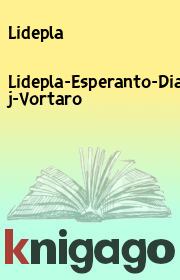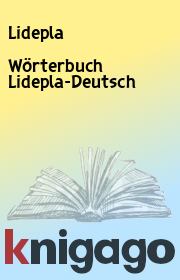Lidepla - Wiki-Grammar of Lidepla
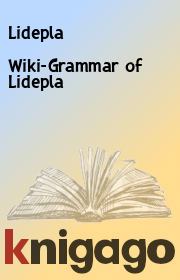 | Название: | Wiki-Grammar of Lidepla |
Автор: | Lidepla | |
Жанр: | Старинная литература | |
Изадано в серии: | неизвестно | |
Издательство: | неизвестно | |
Год издания: | - | |
ISBN: | неизвестно | |
Отзывы: | Комментировать | |
Рейтинг: | ||
Поделись книгой с друзьями! Помощь сайту: донат на оплату сервера | ||
Краткое содержание книги "Wiki-Grammar of Lidepla"
Аннотация к этой книге отсутствует.
Читаем онлайн "Wiki-Grammar of Lidepla". [Страница - 3]
- 1
- 2
- 3
- 4
- 5
- . . .
- последняя (10) »
- { To (that) ke ("that") yu (you) shwo (to say) } es (is) hao (good). – The thing that you are talking about is good.
c) The attribute phrase may have the same subject as the main phrase. In this case the pronoun kel (..na) is used:
- Me (I) vidi (to see) boy (boy) { kel janmog (to know how) gani (to sing) gro-hao (greatly)}. – I see the boy who can sing beautifully.
- Boy (boy) kel janmog (to know how) gani (to sing) gro-hao (greatly) na es (is / are) hir (here). - The boy who can sing beatifully is here.
3.3. predicative:
a) with the particle ke:
- May (my) opina (opinion) es (is) { ke ("that") yu (you) es (is / are) verem (truly) jamile (beautiful) }. – My opinion is that you are really beautiful.
Word
1. Noun
Examples: jen (human), arda (earth), flor (flower), animal (animal).
1.1 Number
a) The basic form of a noun doesn't convey the number:
- jen – a human / many humans
- un (one) jen – a human
- dwa (two) jen – two humans
- mucho (many) jen – many humans
- jenes – humans
b) plural form (the stressed vowel doesn't change):
if the word ends with a vowel: + s: un kitaba (a book) – kitabas, un tabla (a table) – tablas
if the word ends with a consnant: + es: un flor (a flower) – flores, un animal (an animal) – animales
1.2. Case:
a) There are no special case forms.
b) The change of the word order is indicated by the particle den:
- Den sey (this) flor (flower) me (I) pri (to like). – I like this flower.
- den dom (house) sobre (above) – above the house
c) Nominative marker is da (used only when necessary):
- Mata (mother) samaji (to understand) me (I) sam (same) hao (good, well) kom (as) da yu (you). – Mother understands me as well as you do.
- Mata (mother) samaji (to understand) me (I) sam (same) hao (good, well) kom (as) den yu (you). – Mother understands me as well as you.
1.3. Gender:
a) Nouns don't belong to any gender: amiga – friend (male or female)
b) One can specify the sex of a human by:
particles man- and gin-
- leker (doctor) – man-leker (male-doctor) – gin-leker (female doctor)
- kota (cat) – man-kota (male-cat) – gin-kota (female-cat)
changing "a" with -o and -ina:
- amiga (friend) – amigo (male friend) – amigina (female friend)
c) Some nouns imply the sex of the human:
- man (man) – gina (woman)
- boy (boy) – gela (girl)
- patra (father) – mata (mother)
- son (son) – docha (daughter)
- opa (grandfather) – oma (grandmother)
- brata (brother) – sista (sister)
- onkla (uncle) – tia (aunt)
1.4. Apposition may be marked with to (from "to es" – that is):
- Me (I) to kitabnik (book lover) lekti (to read) mucho (much). – I, being a book lover, read a lot.
- Molya (wife) gro-lubi (to adore) suy (her) mursha (husband) to soldata (soldier). – The wife adores her husband who is a soldier.
1.5. There is no article (numeral "un" (one) and demonstrative pronouns like "sey" (this) are used instead, when necessary).
2. Pronouns that function like nouns
2.1. Personal:
a) me (I), nu (we), yu (you), ta (he / she), li (they)
- Nu (we) vidi (to see) li (they). – We see them.
- Me (I) dumi (to think) om (about) yu (you). – I'm thinking about you.
b) lu (he), ela (she), it (it), yu oli (you all), oni (one), ambi (both)
- Oni (one) shwo (to say) ke ("that")... – One says that...
- Es (is) kitaba (book). Me (I) pren (to take) it (it). – This is a book. I take it.
- Me (I) hev (to have) dwa (two) kota (cat). Ambi (both) es (is / are) swate (black). – I have two cats. They both are black.
2.2. Reflexive: swa (oneself), mutu (one another)
- Me (I) woshi (to wash) swa (oneself). – I wash myself.
- Ela (she) lubi (to love) swa (oneself). – She loves herself.
- Nu (we) lubi (to love) mutu (one another). – We love one another.
2.3. Compound:
a) koywan (somebody), koysa (something)
b) eniwan (anybody), enisa (anything)
c) kadawan (everybody), oli (all, everybody), olo (all, everything)
d) nulwan (nobody), nixa (nothing)
2.4. Demonstrative: se (this), to (that)
- Se (this) es (is) auto (car), to (that) es (is) avion (airplane). – This is a car, that is an airplane.
2.5. Relative:
a) ke ("that" – object)
- Es (is) kitaba (book) ke ("that") yu (you) he ("past tense") lekti (to read). – This is the book that you have read.
b) kel ("who / which" – subject, or with a preposition)
- Es (is) boy (boy) kel (who) janmog (to know how) gani (to sing) muy (very) hao (good, well). – This is the boy who can sing very well.
2.6. sama (the same thing)
- Hao (good) Nove (new) Yar (year)! – Sama (the same thing) a yu (to you)! – Happy New Year! – The same (thing) to you!
3. Adjective
Examples: hao (good), jamile (beautiful), blu (blue).
3.1. Comparison:
a) pyu... kem (more... than), meno... kem (less... than)
- May (my) syao (little) kamila (camomille) es (is / are) pyu (more) jamile (beautiful) kem (than) yur (your) gran (big) rosa (rose). – My little camomille is more beautiful than your rose..
b) sam .. kom (as... as),
c) zuy (the most), minim (the least)
- Luy (his) auto (car) es (is) zuy (the most) kway (fast). – His car is the fastest.
d) kem... tem (the... the...)
- kem pyu (more) kway (fast), tem pyu (more) hao (good, well) – the faster, the better
3.2. Intensification:
a) muy (very)
- Ela (she) es (is / are) muy (very) jamile (beautiful). – She is very beautiful.
b) tro (too)
- Sey (this) panta (trousers) es (is / are) tro (too) gran (big). – These trousers are too big.
c) idyen (a little)
- Yur (your) klaida (clothes) es (is / are) idyen (a little) mokre (wet). – Your clothes are a little wet.
d) basta (enough)
- Sey
--">- 1
- 2
- 3
- 4
- 5
- . . .
- последняя (10) »
Книги схожие с «Wiki-Grammar of Lidepla» по жанру, серии, автору или названию:
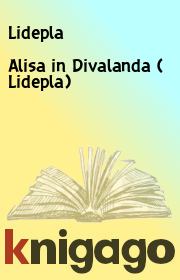 |
| Lidepla - Alisa in Divalanda ( Lidepla) Жанр: Языкознание Год издания: 2019 |
Другие книги автора « Lidepla»:
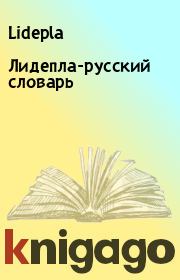 |
| Lidepla - Лидепла-русский словарь Жанр: Языкознание Год издания: 2019 |
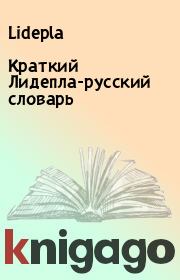 |
| Lidepla - Краткий Лидепла-русский словарь Жанр: Языкознание Год издания: 2019 |
 |
| Lidepla - Грамматический словарь Лидепла Жанр: Языкознание Год издания: 2019 |
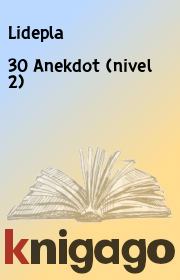 |
| Lidepla - 30 Anekdot (nivel 2) Жанр: Языкознание Год издания: 2019 |


